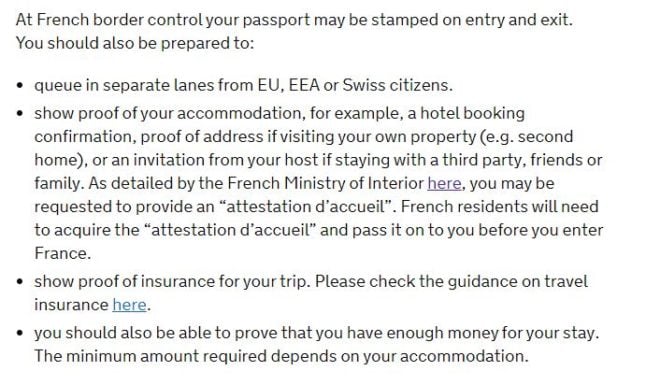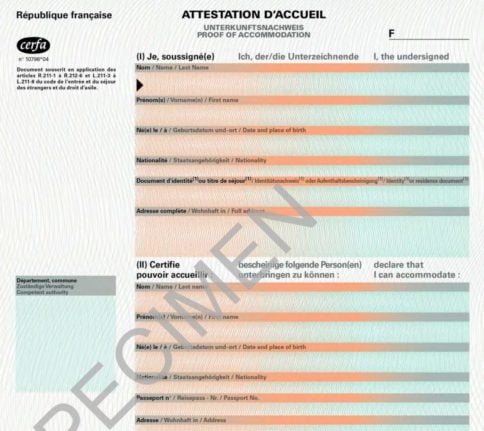Who does this affect?
This applies to British nationals coming to France for a visit of less than 90 days who do not have have either;
- Dual nationality with an EU country
- Residency status in France (carte de séjour or receipt acknowledging carte de séjour application)
- A visa
Is it just Britons?
No, this is the standard rule for all étrangers, which in the context of French bureaucracy means non-EU citizens. So the rule has always been in place for American, Australian, Canadian etc travellers, it’s just new to Brits because they are no longer citizens of an EU country.
READ ALSO What Brexit has changed for British visitors to France

Updated travel guidance on the British government’s travel advice page
What do you need?
When entering France as a non-EU national border guards are within their rights to ask you for;
- Proof of accommodation during your stay (booking for hotel, gîte, Airbnb or B&B for tourists, second-home owners may need to provide proof of address such as a utility bill and if you’re staying with friends or family you may need an attestation d’accueil)
- A return ticket or the means to acquire one
- Sufficient financial means to cover basic costs during your stay. The guideline figures for this are; €65 per day if you have a hotel booking, €120 per day if you have no hotel booking, €32.50 per day if you are staying with friends or family
- Insurance that covers health costs and the cost of repatriation if required
- If you are transiting through France you may be asked for proof of your right to enter your final destination
So who needs the attestation d’accueil?
It’s for people paying “private visits” to France – so really it’s visits to family and friends if you’re staying in their homes. If you have a booking for a hotel, Airbnb, gîte, B&B or similar then you won’t need the attestation as well.
The French Embassy in Canada provides the clearest explanation of this, saying: “It is not the definition of a ‘private visit’ and not a tourist visit that counts, but the fact that you are staying in a private home rather than a hotel or similar.
“In fact, proof of accommodation covering the entire duration of the stay (hotel reservation and/or certificate of accommodation with a relative previously validated at the town hall) is one of the supporting documents that must be presented at the border upon arrival in France of a third country national (outside the EU).”
If you’re staying in your own property while visiting – ie second-home owners – you may need to provide proof of your ownership such as property deeds or utility bills in your name.
Basically, everyone needs some type of proof of where they will be staying and if you’re staying with family or friends, that proof is via the attestation d’acceuil.
If you’re travelling as a family then spouses or legally registered partners plus children aged under 18 can all be covered by the same form, but two friends travelling to stay with the same person would need a form each.
READ ALSO What to do if you cannot get the attestation d’accueil before your visit
The Local asked the Interior Ministry if they could could confirm that this definitely applies to Brits and they confirmed that it does – but added an extra provision that can be used instead of the attestation d’acceuil.
A spokesman for the Interior Ministry told us: “British tourists, who are now third-country nationals, are subject to compliance with the conditions for entry into the Schengen area under Article 6 of the CFS.
“Since January 1st 2021, they must have proof of sufficient means of subsistence both for the duration of their intended stay and for their return to the UK.
“To enter France, British tourists must therefore present
– an attestation d’acceuil issued by the town hall (if they are staying in private accommodation) or a hotel reservation (which can be replaced by a sum of €120 per person per day)
– proof of means of subsistence (65 euros per day in the case of hotel accommodation or 32.50 euros in the case of an accommodation certificate)
– a certificate of insurance for repatriation on medical grounds”
Therefore people who cannot provide either a hotel booking or an attestation d’acceuil to have a third option – being able to provide proof that they have at least €120 for each day of their stay in France.
You don’t have to pay out this money to anyone, you just need proof – bank statements, cash, travellers cheques or credit card – that you have it and therefore will not become a burden on the French state during your stay.
Come on, do I really need to do this every time my mate/sister/mum visits? Who will check?
This is a good question. As mentioned, this has always been the rule for other non-EU visitors, but when we asked about it in a couple of “Americans in France” Facebook groups most people had never even heard of it.
It’s the same with the requirements to show a return ticket and proof of means at the border, they are technically the rules but asking around Americans and Australians in France reveals that they are not often checked.
However, just because these checks don’t happen often it doesn’t mean that they don’t happen at all and if you are asked and cannot provide the correct paperwork, you can, in theory, be turned back at the border. Because Covid has dramatically decreased travel since the end of the Brexit transition period, at this stage we really don’t know how strictly the UK/France border is being manned.
There’s also politics to factor into all this – over in the UK, EU nationals visiting friends/family who don’t have the correct papers have actually been locked up in detention centres in a series of cases that are causing increasing anger. There’s no suggestion that France will start doing this, but if this becomes a political issue it’s not impossible that checks could be stepped up at the border.
Ok fine, how do I get hold of one of these attestations?
The person who actually applies is the host, not the guest.
If you are having a British guest to stay with you, you apply in advance to your local mairie, pay a fee, get the attestation validated and then send a copy (an electronic copy is fine) to your guests for them to show at the border if necessary.
What’s the process?
The host contacts their local mairie (for people living in Paris, Lyon and Marseille that’s the arrondissement mairie) and requests the form for the attestation d’accueil or form number n°10798 (you can find a sample copy of the form here).

You then fill it in and provide supporting documents. These vary slightly depending on whether you are French, European or a non-EU citizen but you will need;
- ID
- Proof of your right of residence in France if you are not French or European
- Property deeds or a rental contract for the address your guests will be staying at
- A recent utility bill
- Documents to prove your financial means (pay slips, most recent tax return) plus a commitment to take care financially of your guest if necessary
The form costs €30 and can be paid with either a timbre fiscale or by card, depending on the system at your mairie.
The official then signs and stamps the attestation and you can send a copy to your guest to show at the border if necessary.
The validation of the attestation is not necessarily done on the same day, if it is not you will be given a receipt while your application is processed. The maximum time allowed for processing is one month.
The mayor or official has the right to refuse your request on the following grounds:
- The host cannot present the required supporting documents,
- The visitor cannot be accommodated in normal housing conditions
- The information provided is inaccurate
- Certificates previously requested by the applicant show a misuse of procedure
You can find full details on the process here.
The certificate relates to only one visit, so you will need to do this every time you have guests.
Are there any exemptions?
Yes, some. As mentioned above, this only relates to Brits who have neither a visa, French residency or dual nationality with an EU country and who are on a visit of less than 90 days.
However there are some other exemptions:
- A person staying for humanitarian reasons, eg refugees
- A person involved in a cultural exchange, usually through a recognised programme
- A medical emergency if the person visiting is seriously ill, or they are visiting a loved one who is seriously ill
- A funeral, if the guest is travelling to attend the funeral of a loved one.
Find full details here.
As mentioned above, the alternative option is to present proof of your financial means at the border and this could be useful for – for example – someone whose mate has lent them their second home for a cheap holiday.
I’m confused
Yes, it is confusing and we don’t really know how this is going to work in practice with the mairies, especially in smaller places in rural France where there is not a lot of immigration paperwork usually processed.
It’s also very unclear exactly how strict border controls will be on this type of paperwork.
Claire Waddington from citizens’ rights group Remain in France Together (RIFT) said the situation was “confusing and frustrating”, and added that her group was working on getting further clarity.
You can contact us on [email protected] if you have any questions.



 Please whitelist us to continue reading.
Please whitelist us to continue reading.
This article has the wrong link to support “EU nationals visiting friends/family who don’t have the correct papers have actually been locked up in detention centres in a series of cases that are causing increasing anger.” Sadly, it won’t surprise me if this UK government really is locking up EU nationals trying to visit friends and family in the UK, but the only cases I have read about so far involved EU nationals going to the UK for job interviews, or to look for work, or to be au pairs (who still should not have been locked up in detention centers, obviously). If you have heard of EU nationals being locked up when they are only trying to visit friends or family, could you please post the correct link? Thanks in advance!
The only people being stopped are those who want to work in the U/K but don’t have visas to do so. The young girl who it was said was going to be an au pair didn’t have a visa. Her uncle thought this would help her but instead got her stopped from entering the country. She would have automatically been allowed in if he hadn’t made such a silly mistake. But at least you don’t have to pay to visit relatives!
This is basically a visa in all but name . So much for reciprocal visa-free travel.
One of our family is a Chines national, resident in UK. To come to France she has to have a Visa, and she has been told that to get the Visa she has to have the Attestation d’Acceuil.
And yes it’s true, I had to dig out the deeds (Acte de Vente), as well as proof of our income, Avis d’Impots. But NOT the good ole justificatif de domicile. Which is distinctly over the top.